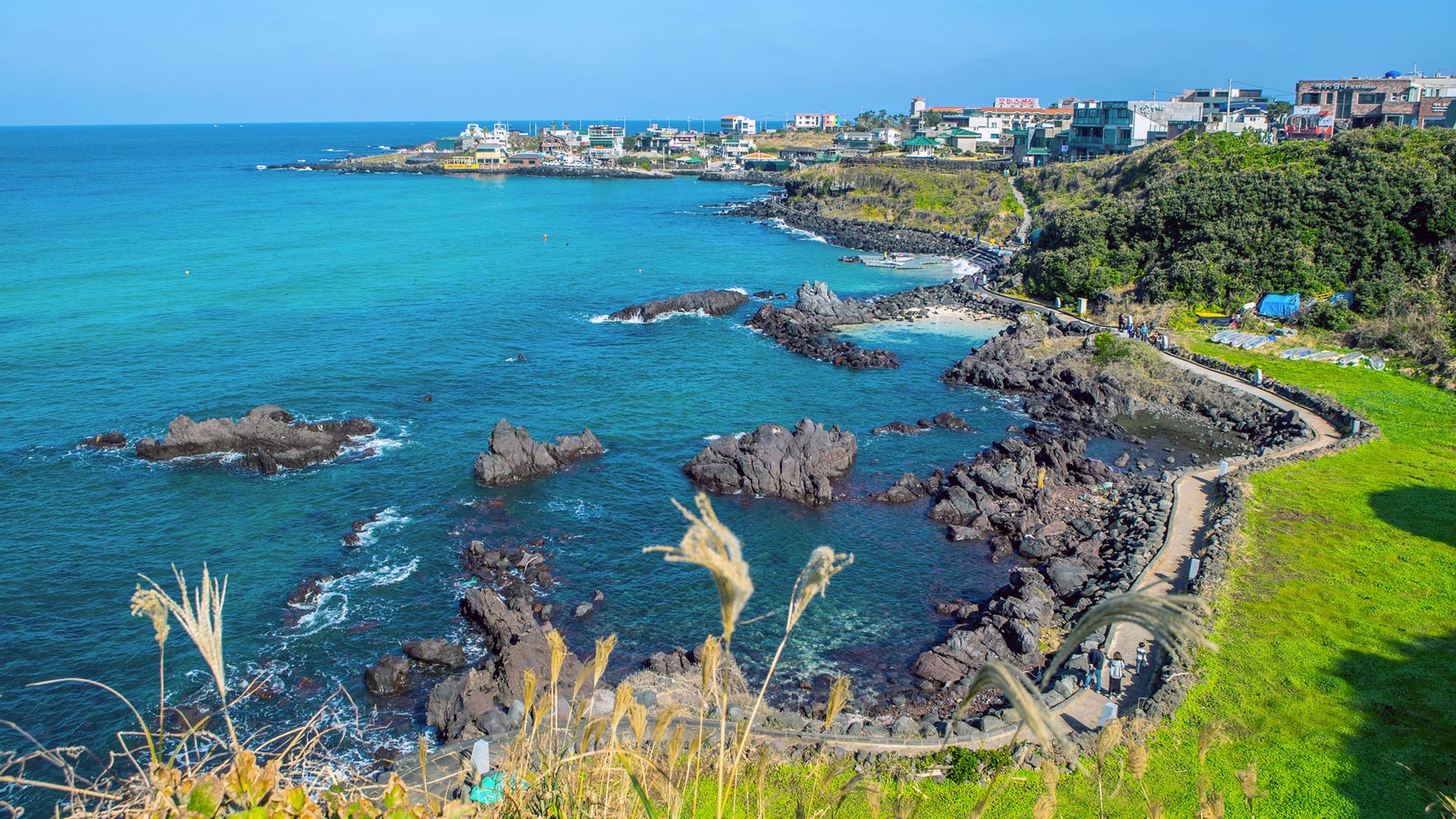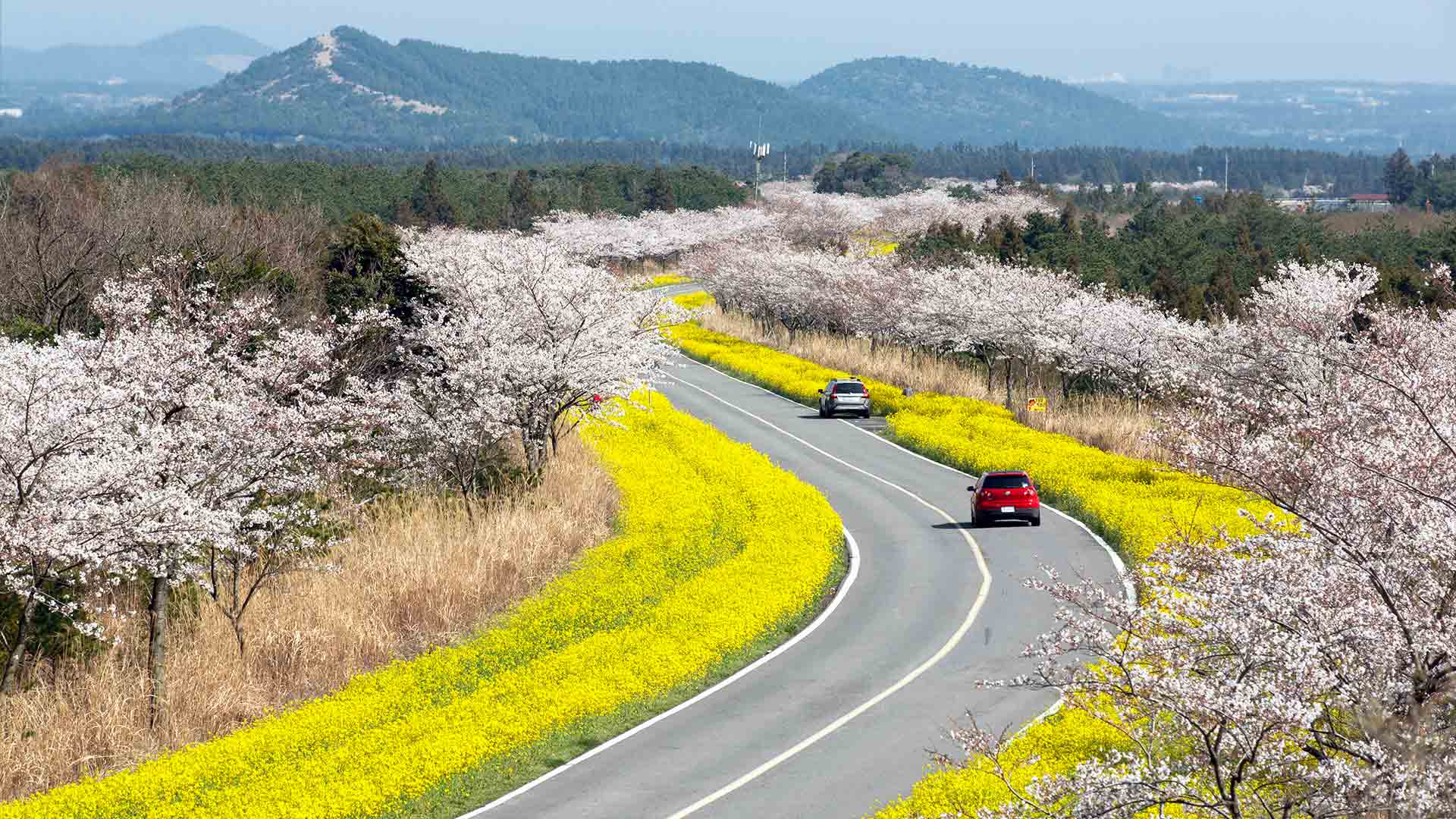
Jeju Island:
South Korea’s Paradise Escape
Stunning landscapes, enchanting hotels, and unforgettable experiences await South Korea’s top paradise escape
South Korea’s Jeju Island isn’t quite like anywhere else. Thousands of years ago, volcanoes were carved out from intense geographical activity, including meandering coastlines and soaring mountains. The fertile soil has cultivated vibrant flower fields and verdant forests. And the subtropical sun casts a summery glow on the beaches, offering visitors a warm welcome.

“It looked exotic,” said Kang Sae-byeok, better known as Player 067, one of the heroes of Netflix’s hit show Squid Game, after revealing that she’d seen Jeju Island on television. “It didn’t look like Korea at all.”
What makes Jeju so special?
Stunning Landscapes
Jeju’s unending landscapes attract visitors from across the world. Already a top destination for South Koreans, Jeju is a top draw for active travelers, from nature enthusiasts and zealous hikers to laid-back cyclists and leisurely strollers.
Dominating these landscapes is the UNESCO-recognized Hallasan Mountain. Soaring 1,950 meters above sea level, Hallasan Mountain is South Korea’s tallest mountain and an essential climb for hikers. During winter, Hallasan Mountain sits frosted with snow that sometimes descends into the valleys. The trails burst with color all year round, from pink and purple blooming flowers in spring to red and orange deciduous leaves in fall.
Unique to Jeju is a collection of volcanic cones, locally known as “oreums”, and a UNESCO World Heritage site. There are hundreds of oreums that offer different walking paths, including thick forests of Geomun Oreum and grassy paths that roll over Saebyeol Oreum.
For those wanting to keep to the coast, several trails envelope the island and hug the curvy shoreline. The Jeju Olle Trail is over 250 miles of walking trails with 26 routes, each crossing different hotspots, including oreums, beaches, and local villages. The Jeju Fantasy Bicycle Trail also circles the island and completing the entire track takes at least five days.
Sensory Experiences
Between all the hiking and biking, visitors can fuel up on some of South Korea’s freshest and tastiest cuisine – as well as do a spot of people watching in some of the country’s trendiest cafes.
Jeju offers many of South Korea’s hearty noodle soup dishes, which are served hot to warm the soul in winter or cold to cool things down in summer. There are also island specialties like mouthwatering Jeju Black Pork, which is served barbeque style with sides of salads, pickles, and dipping sauces. Hungry travelers can tuck into traditional fare in community-run restaurants such as Hahyo Salon, which specializes in dishes using the island’s citrus fruits. The restaurant also has an experience center, where aspiring pastry chefs and craft enthusiasts can try their hand at baking citrus tarts and making scented candles. Afterward, they can sip on coffee in cafes by the ocean, which offers sweeping views of the coast.
Beyond the culinary experience, the Seogwipo Forest of Healing is an invitation to calm. This gentle, almost seven-mile path crisscrosses lush forests, just like other trails on Jeju. There are secluded spots along the path where visitors can sit in their quiet moments peacefully. The Camellia Forest offers a similar tranquil experience, with domed red flower bushes that bloom in December and January, making for peaceful wandering.
A Night in Jeju
Visitors should try to fit in an overnight experience in Jeju Island’s natural splendor. On the slopes of Hallasan Mountain is the WE Hotel Jeju, encircled by forest and famous for its comprehensive wellness programs, including volcanic water treatments and sound healing. On the southern coast is the Jungmun Tourist Complex, with a collection of world-class hotels, yellow-sand beaches, picturesque waterfalls, as well as The Cliff, a beach bar with scenic views.
Meanwhile, in the bustling centers of Jeju and Seogwipo, the island’s two main cities, visitors can choose from various modern hotels that reflect South Korea’s cutting-edge flair. The Grand Hyatt Jeju, for example, is a 38-story contemporary wonder, with 14 restaurants, two spas, and an infinity pool offering views of both the city and the coastline.
An Unforgettable Journey
With the perfect mix of breathtaking landscapes and delectable feasts, there is something for every traveler in Jeju Island. So, pack your hiking boots and get ready to explore.























